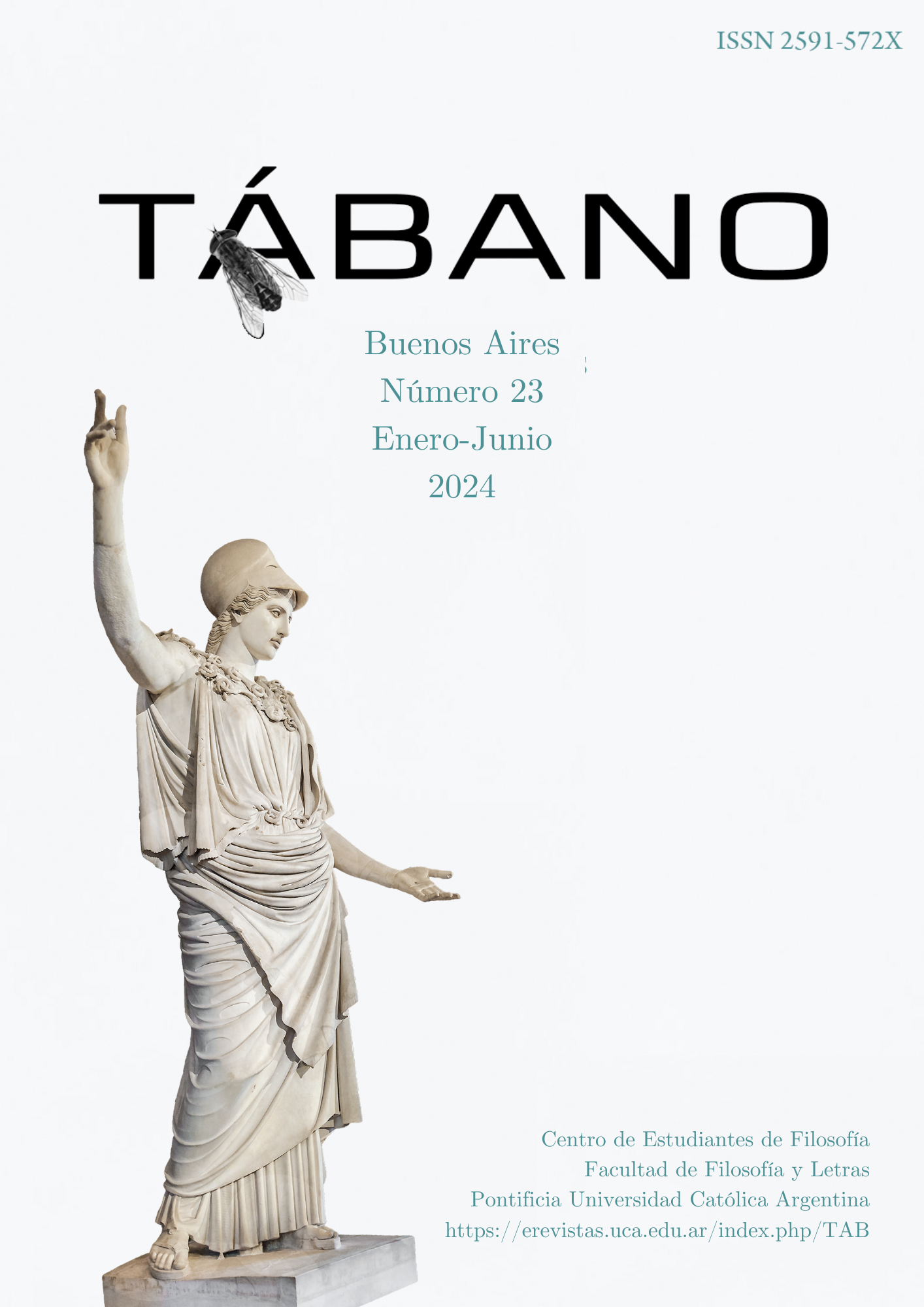Is the kehre an realistic proyect?
DOI:
https://doi.org/10.46553/tab.23.2024.p8-32Keywords:
Heidegger, New Realism, Turn, Realism, Anti-realism, Objects, Fields of senseAbstract
In this essay I consider the relationship between Heidegger’s famous “turn” (Kehre) and realism. I begin with Heidegger’s critique of the problem of an external world, and I describe how this critique anticipates New Realism. I then provide a reconstruction of Heidegger’s self-critique of Being and Time, showing how this work (written before the turn) exhibits a higher-order antirealism. Next, I show how Heidegger’s turn is motivated by the inadequacy of this earlier anti-realism. In his philosophy of the event he moves towards a realist ontology by developing concepts such as “destiny” (Geschick), which he understands to be independent of human attitudes. Nevertheless, Heidegger ultimately falls back into an anti-realism, because Being still remains dependent upon the involvement of human beings. I therefore conclude this essay by briefly arguing for my own version of New Realism, according to which objects are meaningful in a way that is independent of our attitudes towards them.
Downloads
References
Adorno, T. (2012). Sobre la metacrítica de la teoría del conocimiento. Akal.
Benoist, J. (2011). Eléments de philosophie réaliste. Vrin.
Boghossian, P. (2007). Fear of Knowledge: Against Relativism and Constructivism. Oxford University Press.
Brandom, R. (2002). Heidegger’s Categories in Sein und Zeit. En Robert B. Brandom, Tales of the Mighty Dead.
Historical Essays in the Metaphysics of Intentionality (pp. 298-323). Harvard University Press.
Brandom, R. (2009). Reason in Philosophy: Animating Ideas. Harvard University Press.
Chalmers, D. (2012). Constructing the World. Oxford University Press.
Deleuze, G. (2019). Lógica del sentido. Surcos.
Derrida, J. (1993). La voz y el fenómeno. Introducción al problema del signo en la fenomenología de Husserl. Pre-Textos.
Dummett, M. (1978). Truth and Other Enigmas. Harvard University Press.
Dummett, M. (1991). The Logical Basis of Metaphysics. Harvard University Press.
Ferraris, M. (2013). Manifiesto del Nuevo Realismo. Biblioteca Nueva.
Fichte, J. G. (1975). Versuch einer neuen Darstellung der Wissenschaftslehre (1797/98). Meiner Verlag.
Gabriel, M. (2006). Der Mensch im Mythos. Untersuchungen über Ontotheologie, Anthropologie und Selbstbewußtseinsgeschichte in Schellings »Philosophie der Mythologie«. De Gruyter.
Gabriel, M. (2008a). An den Grenzen der Erkenntnistheorie. Die notwendige Endlichkeit des objektiven Wissens als Lektion des Skeptizismus. Alber.
Gabriel, M. (2008b). Der ‚Wink Gottes‘ – Zur Rolle der Winke Gottes in Heideggers Beiträgen zur Philosophie und bei Jean-Luc Nancy. Jahrbuch für Religionsphilosophie (2008/7): pp. 145-173.
Gabriel, M. (2011). Unvordenkliches Sein und Ereignis – Der Seinsbegriff beim späten Schelling und beim späten Heidegger. En: Lore Hühn y Jörg Jantzen (eds.), Heideggers Schelling-Seminar (1927/28). Die Protokolle von Martin Heideggers Seminar zu Schellings Freiheitsschrift” (1927/28) und die Akten des Internationalen Schelling-Tags 2006 (pp. 81-112), Bad Canstatt.
Gabriel, M. (2013a). Die Erkenntnis der Welt. Eine Einführung in die Erkenntnistheorie. Alber.
Gabriel, M. (2013b). Schellings Antwort auf die Grundfrage der Metaphysik in der Urfassung der Philosophie der Offenbarung. En Daniel Schubbe, Jens Lemanski und Rico Hauswald (eds.), Warum ist überhaupt etwas und nicht vielmehr nichts? Wandel und Variationen einer Frage (pp. 159-187). Meiner.
Gabriel, M. (ed.) (2014a). Der Neue Realismus. Suhrkamp Verlag.
Gabriel, M. (2014b). Nazi aus dem Hinterhalt. Die Welt (7.3.2014).
Gabriel, M. (2014c). Fields of Sense. A New Realist Ontology. Edinburgh University Press.
Gabriel, M. (2019). Por qué el mundo no existe. Pasado y Presente.
Gabriel, M. y Žižek, S. (2009). Mythology, Madness and Laugther. Subjectivity in German Idealism. Continuum.
Harman, G. (2013). Undermining, Overmining, and Duomining: A Critique. ADD Metaphysics. Aalto University Design Research Laboratory, pp. 40-51.
Hegel, G. W. F. (1986). Phänomenologie des Geistes. Suhrkamp Verlag.
Heidegger, M. (1994). Conferencias y artículos. Ediciones del Serbal.
Heidegger, M. (2000). Tiempo y ser. Tecnos.
Heidegger, M. (2001). Hitos. Alianza Editorial.
Heidegger, M. (2002). Serenidad. Ediciones del Serbal.
Heidegger, M. (2007). Los conceptos fundamentales de la metafísica. Mundo, finitud, soledad. Alianza Editorial.
Heidegger, M. (2010). Caminos de bosque. Alianza Editorial.
Heidegger, M. (2011). Aportes a la filosofía. Acerca del evento. Biblos.
Heidegger, M. (2012). Ser y tiempo. Trotta.
Heidegger, M. (1988). La vuelta (Die Kehre). Revista De Filosofía, pp.109–116. Recuperado a partir de https://revistafilosofia.uchile.cl/index.php/RDF/article/view/44153
Hogrebe, W. (2009). Riskante Lebensnähe. Die szenische Existenz des Menschen. Akademie Verlag.
Koch, A. F. (2006). Versuch über Wahrheit und Zeit. Mentis.
Latour, B. (2013). Investigación sobre los modos de existencia. Una antropología de los modernos. Paidós.
McDowell, J. (2000). Mind and World. Harvard University Press.
Meillassoux, Q. (2018). Después de la finitude. Ensayo sobre la necesidad de contingencia. Caja Negra.
Moore, A. W. (1997). Points of View. Oxford University Press.
Rometsch, J. (2012). Descartes, Heidegger und die neuzeitliche Skepsis. Skeptizismus und Metaphysik. Deutsche Zeitschrift für Philosophie Sonderband 28, ed. Markus Gabriel, pp. 105-129.
Schelling, F. W. J. (1856-1861). Philosophie der Offenbarung. Cotta.
Schelling, F. W. J. (1992). Urfassung der Philosophie der Offenbarung. Meiner.
Schelling, F. W. J. (1998). System der Weltalter. Münchener Vorlesung 1827/28 in einer Nachschrift von Ernst von Lasaulx. Klostermann.
Schopenhauer, A. (2010). El mundo como voluntad y representación (Volumen II). Editorial Gredos.
Sider, T. (2012). Writing the Book of the World. Oxford University Press.
Smith, B. (2009). Questions of Taste. The Philosophy of Wine. Harvard University Press.
Stroud, B. (1984). The Significance of Philosophical Scepticism. Oxford University Press.
Volbers, J. (2012). Wie ‚natürlich‘ ist der Skeptizismus? Überlegungen zum historischen Grund der skeptischen Erfahrung. Skeptizismus und Metaphysik. Deutsche Zeitschrift für Philosophie, 28, pp. 155-166.
Williams, B. A. O. (2005). Descartes. The Project of Pure Enquiry. Routledge.
Williams, M. (1996). Unnatural Doubts. Princeton University Press.
Wright, C. (2004). Warrant for Nothing (and Foundations for Free). Aristotelian Society Supplementary 78/1, pp. 167-212.
Downloads
Published
How to Cite
Issue
Section
License
Copyright (c) 2024 Mateo Belgrano; Markus Gabriel

This work is licensed under a Creative Commons Attribution-NonCommercial-ShareAlike 4.0 International License.


